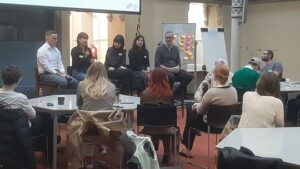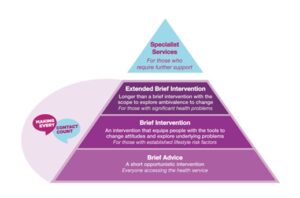
SPHeRE Scholar Rebecca Trower
My name is Rebecca Trower, and I am a Year 2 SPHeRE scholar based in the University of Galway. I have a background in Health Psychology, and I’m interested in behaviour change interventions aimed at improving patient outcomes in relation to their physical health. My PhD research focuses on the delivery of behaviour change interventions in mental health settings, specifically the ‘Making Every Contact Count’ (MECC) programme. This is a standardised behaviour change programme rolled out nationally by the Health Service Executive (HSE).1 This programme aims to train and enable healthcare professionals to encourage patients to adopt healthier behaviours, addressing issues such as smoking, alcohol and drug use, physical activity and diet during routine consultations. I’m particularly interested in the implementation of the MECC programme in mental health settings, as those with mental health difficulties have a higher prevalence of these health-related behaviours and thus, a higher risk for chronic disease than the general population2. I plan to explore the current application of MECC in mental health settings and identify opportunities for improvement.
Recently, I had the privilege of speaking on a panel at the SPHeRE Peer Learning Day, where I reflected on the first year of my PhD and the groundwork I laid to conduct mental health research. This year was crucial for anticipating potential barriers I may face in my PhD journey and for developing strategies to overcome them, particularly, regarding recruitment. Attracting healthcare professionals to participate in research is a common challenge often due to their busy schedules, time pressures, and the perceived burden of involvement in research. In this blog, I’d like to share some invaluable lessons I’ve learned in the first year of my PhD that will help me (and hopefully you!) navigate challenges when conducting mental health research and beyond.

The Scholar and Alumni Panel at the SPHeRE Peer Learning Day on September 27th, 2024
Establishing Important Networks
One of the most impactful pieces of advice I received from my supervisor, Prof. Molly Byrne, during our first supervision meeting was to prioritise building connections with key stakeholders in my research area. While this sounded daunting, I was fortunate to be able to build on existing contacts from Prof. Byrne’s previous MECC research. Early on, I connected with the national MECC implementation team, where I presented my research plans, demonstrating their relevance and took feedback on board.

The Making Every Contact Count Model (Source: Health Service Executive 2016)1
However, I quickly realised that I needed to expand my network beyond these initial contacts. This meant stepping out of my comfort zone and engaging in the dreaded task of networking. I learned that I needed to put myself out there and not be afraid to reach out to people via email, attend meetings, and make myself and my research plans known. By doing so, I connected with mental healthcare professionals, HSE policy makers, and health promotion and improvement officers nationwide. To my delight, many were enthusiastic about discussing my research and helping me refine my plans. These relationships will be invaluable as I recruit participants for my studies; endorsements from these stakeholders will facilitate smoother recruitment and enhance the impact of my research.
Making the Most of Placement Opportunities
As part of the SPHeRE programme, I participated in a national placement over the summer. I worked closely with the national MECC implementation team, completing the MECC e-learning training, and securing their support for my research. Additionally, I collaborated with health promotion and improvement officers in Community Health Organisation (CHO) 8, who provided insights into ongoing MECC implementation in mental health settings and agreed to help me with recruitment. Another highlight of my placements was observing an enthusiastic mental health nurse in Dublin during his consultations with mental health patients. This was an excellent opportunity to see MECC in practice and he agreed to spread the word about my research among his colleagues, which will also aid my future recruitment efforts and ensure my research is relevant to those working on the ground.
Some Practical Tips
The first year of the SPHeRE PhD programme gave me the opportunity and space to develop my research ideas fully, anticipate future challenges, and prepare to conduct high-quality research. To summarise, here are a few practical tips that may help anyone going forward in their research journeys to overcome potential challenges:
Be Proactive: Don’t wait for opportunities to come to you. Reach out to key stakeholders in your field, network, and engage in discussions.
Communicate Value: Clearly outline how participation and collaboration in your research can benefit potential participants and stakeholders.
Follow Up: After initial meetings or discussions, send follow-up emails thanking them for their time and reiterating your interest in collaboration.
Take-Home Message
Establishing networks with key stakeholders in your research area is critical—whether in mental health or any other field. The connections I have made have already proven beneficial, even before my research officially begins. I look forward to fostering these collaborations as I progress, with the hope that they will be mutually valuable.
References
- Health Service Executive. Making every contact count: A health and behaviour change framework and implementation for health professionals in the Irish health service [Internet]. Dublin: Health Service Executive; 2016 [cited 2024 October 18] Available from: https://www.hse.ie/eng/about/who/healthwellbeing/making-every-contact-count/making-every-contact-count-framework.pdf
- De Hert M, Correll CU, Bobes J, Cetkovich-Bakmas M, Cohen DA, Asai I, Detraux J, Gautam S, Möller HJ, Ndetei DM, Newcomer JW. Physical illness in patients with severe mental disorders. I. Prevalence, impact of medications and disparities in health care. World psychiatry. 2011 Feb;10(1):52.

